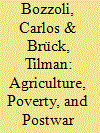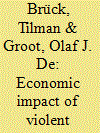|
|
|
Sort Order |
|
|
|
Items / Page
|
|
|
|
|
|
|
| Srl | Item |
| 1 |
ID:
088356


|
|
|
|
|
| Publication |
2009.
|
| Summary/Abstract |
This article analyzes the effects of household-level activity choices on farm household welfare in a developing country affected by mass violent armed conflict. The study uses household survey data from postwar Nampula and Cabo Delgado provinces in Northern Mozambique capturing many activity choices, including market participation, risk and activity diversification, cotton adoption, and social exchange, as well as income-and consumption-based measures of welfare. The study advances the literature on postwar coping and rural poverty at the micro level by estimating potentially endogenous activity choices and welfare outcomes using instrumental variables. The study finds that increasing the cultivated area and on-farm activities enhances postwar welfare of smallholders exploiting wartime survival techniques. Subsistence farming reduces income but does not affect consumption, while market participation has positive welfare effects. This suggests that postwar reconstruction policies should encourage the wartime crop mix but offer enhanced marketing opportunities for such crops. Cotton adoption, which was promoted by aid agencies in the postwar period, reduces household welfare per capita by between 16% and 31%, controlling for market access. This contradicts previous studies of postwar rural development that did not control for the war-related endogeneity. Hence, addressing the potential endogeneity of activity choices is important because the standard regression approach may lead to biased estimates of the impact of activity choice on welfare, which in turn may lead to biased policy advice. The article discusses and contextualizes these findings, concluding with a discussion of suitable pro-poor reconstruction policies for national governments and donors.
|
|
|
|
|
|
|
|
|
|
|
|
|
|
|
|
| 2 |
ID:
124517


|
|
|
|
|
| Publication |
2013.
|
| Summary/Abstract |
Much of the work published in Defence and Peace Economics (DPE) significantly contributes to our understanding of the economics of conflict. Analyzing the second decade of its existence, Arce and Kollias (2010) showed that over time, the emphasis of work in DPE has shifted significantly. One rising field examines the consequences of conflict. Related to this, in 2011, DIW Berlin hosted a conference examining The Economic Impact of Violent Conflict. This special issue is the result of that conference. While this may seem like a relatively narrow area, the interpretation of that simple combination of words can be quite broad. Some of the core work in the area focuses on the calculation of the global impact of conflict (Collier, 1999, Hess, 2003, Brück, De Groot, and Bozzoli, 2012). The work of Collier (1999) has had the greatest impact and continues to do so. He focuses only on civil conflicts because of the perceived economic strengthening effects of international conflict. Collier argues that civil conflict affects growth through (i) the destruction of resources; (ii) the disruption of infrastructure and social order; (iii)
budgetary substitution; (iv) dissaving; and (v) portfolio substitution by foreign investors.
The first four of these channels are expected to influence an economy only during conflict, whereas the final one is likely to continue having a lasting effect even after the restoration of peace. This led Collier to come to his theory that the length of the conflict is going to influence the impact of the post conflict period. In particular, he argues that long-running conflicts are more likely to be followed by an increase in growth, whereas short-lasting conflicts will suffer reduced growth rates over a longer period of time (known as a legacy effect).
|
|
|
|
|
|
|
|
|
|
|
|
|
|
|
|
|
|
|
|
|